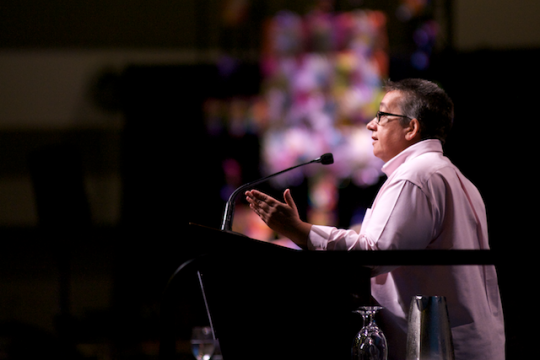Exploring the issues of responsible resource extraction
Categories: Anglican Church of Canada, Evangelical Lutheran Church in Canada

Sarah Stratton, Education and Campaigns Program Coordinator for KAIROS, presents to Joint Assembly on resource extraction.
Jennifer Henry, Executive Director of KAIROS, and Sarah Stratton, Education and Campaigns Program Coordinator for KAIROS, offered a powerful presentation to delegates at the 2013 Joint Assembly on the devastating effects of irresponsible resource extraction in Canada and around the world. Their presentation offered delegates the opportunity to become more familiar with the issues of resource extraction and the call to Canadian Churches to form global partners and work with Indigenous peoples of Canada.
Delegates were first asked to remove items they were wearing or owned that came from a mined resource, and then reflect on their tangible or emotional connection to them. The item may have been a sign of commitment to one’s spouse; a communication device needed for their job or having no purpose other than its beauty.
Sarah then asked the delegates to reflect on whether they knew where the mineral in the objects came from. Answers ranged anywhere from “a conflict-free diamond mine in the Northwest Territories” to “I don’t know.
The issues around resource extraction are complex. It is a significant part of the Canadian economy – one in every 54 jobs in Canada is in mining and more than 20,000 people are employed directly in the oil sands; another 40,000 are in related jobs – and in many countries around the world.
Issues arise when Canadian mining corporations working in developing countries implement mining practices that would not be acceptable in Canada. Even in Canada, attempts to strengthen a weak economy by developing and expanding mines seem to override environmental protection concerns.
Evangelical Lutheran Church in Canada National Bishop Susan Johnson shared her experience of a recent trip to visit Lutheran Church in Peru and Argentina where members of the church shared with her their stories of villages being impacted by mining operations.
Concerns included struggles to insure safe water, preserve a healthy environment, and maintain community and lifestyle. “These friends and fellow members of the Lutheran World Federation shared that the company is a Canadian mining company,” said Bishop Johnson. “And they wondered what the Canadian church was doing to address issues of rights and justice.”
“One of my biggest images is that we are all in this together,” continued Bishop Johnson. “There is one earth and human family. The challenge before us is how to we share the resources of Mother Earth in ways that uphold the dignity and well-being of every child of God, and in ways that are respectful of the whole environment.”
A significant action delegates will take at the 2013 Joint Assembly is to affirm a joint declaration calling on the two churches to work together even more intentionally in the areas of homelessness, affordable housing and responsible resource extraction. Within the area of resource extraction, the declaration will call on the churches to learn more about the issues of resource extraction, raise awareness within one another’s communities, act to support partners, advocate for responsible and ethical investment and pray for the humility and discipline to use the Earth’s resources wisely and responsibly.

I’m trying to find a copy of the Joint Declaration on line – but I can only find references to it. Help
No worries, Ann. You can find it here.